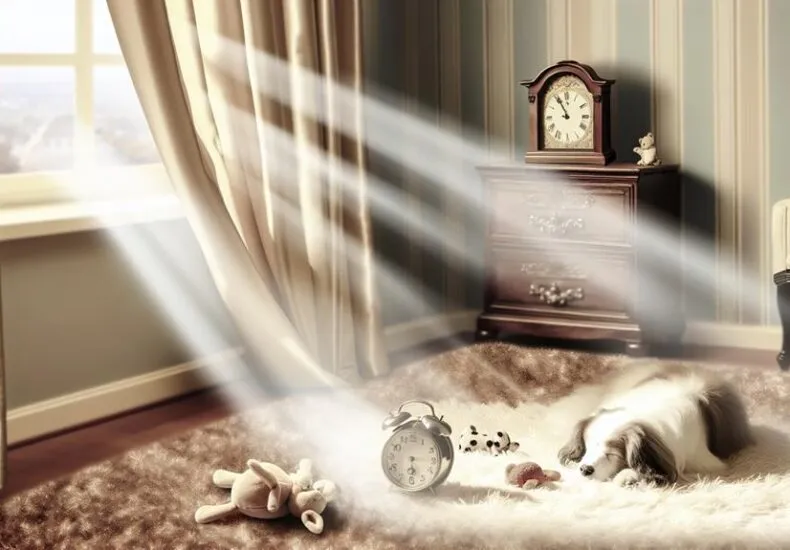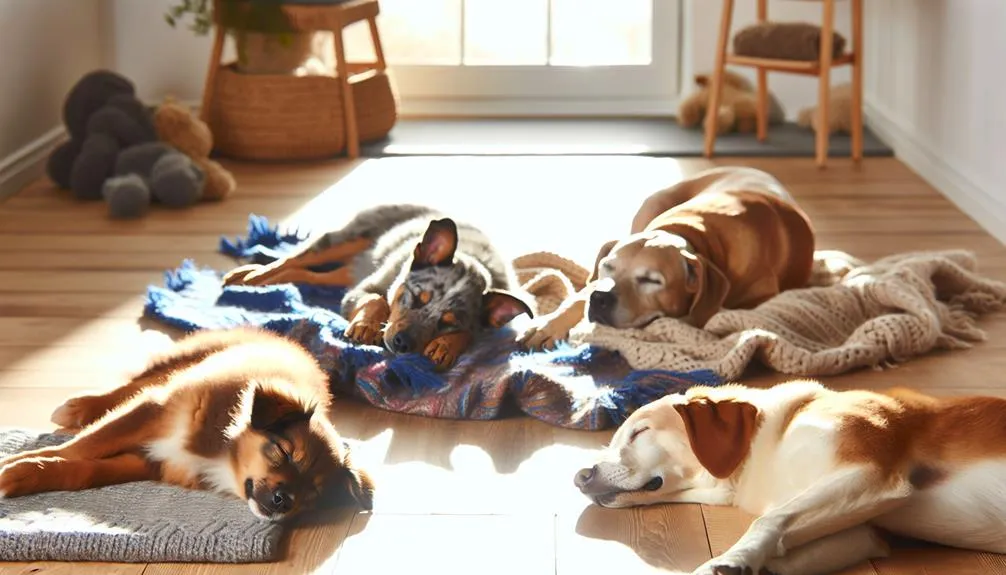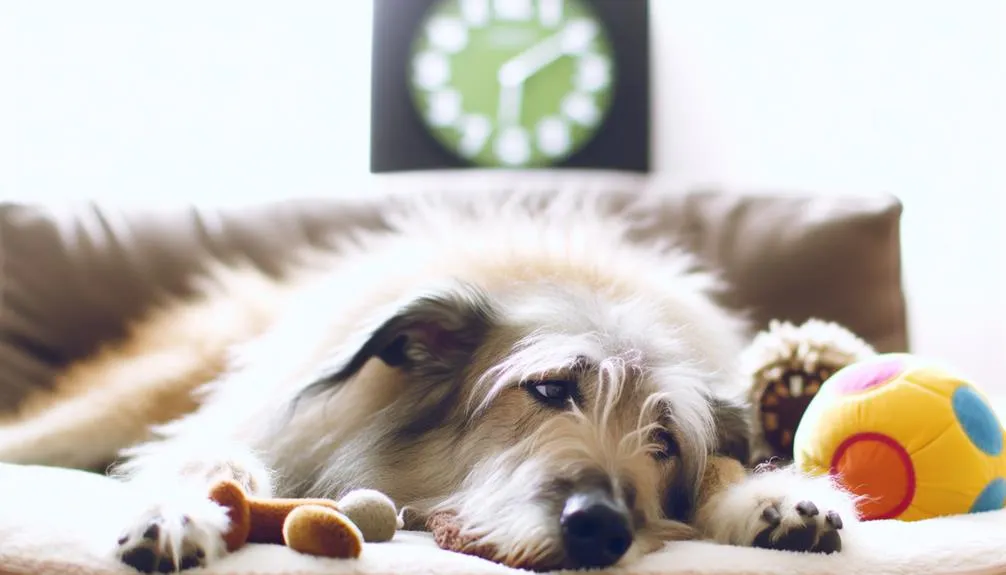
How Many Hours a Day Does a Dog Sleep
You might be surprised to learn that dogs typically sleep between 12 to 14 hours a day, but this figure isn't fixed. Factors like age, breed, and activity level can greatly influence how much shut-eye your dog gets. For instance, puppies can clock in up to 20 hours, while older dogs might need a bit more rest. Understanding these nuances can be essential for ensuring your pet's well-being. But what happens when a dog doesn't get enough sleep? The effects might be more noticeable than you think.
Average Sleep Duration
On average, dogs sleep between 12 to 14 hours a day, but this duration can vary greatly based on factors like age, breed, and activity level. Puppies, for instance, may sleep up to 18-20 hours daily due to their rapid growth and development needs. Conversely, adult dogs typically require less sleep, falling towards the lower end of the spectrum. As dogs age, their sleep patterns can shift, with seniors often taking longer naps throughout the day.
The sleep environment plays a vital role in determining how well your dog sleeps. A quiet, comfortable space can considerably enhance their rest. Ensuring that your dog has a designated sleeping area, free from disturbances, can promote better sleep quality. You might consider soft bedding, away from high-traffic areas, to help facilitate a restful environment.
Moreover, dog comfort is paramount. Factors like temperature, lighting, and noise levels can influence your dog's willingness to settle down. A cooler room with dim lighting can create a more conducive atmosphere for sleep. Additionally, providing a cozy, supportive bed tailored to your dog's size can encourage them to relax and drift off more easily.
Factors Influencing Sleep
Several factors influence a dog's sleep patterns, impacting both the duration and quality of their rest. Understanding these factors can help you create an ideal environment for your furry friend.
Firstly, the sleep environment plays a essential role. A quiet, comfortable space with minimal disturbances promotes better rest. Comfort factors such as bedding quality and temperature also considerably affect how well your dog sleeps.
Moreover, health influences cannot be overlooked. Dogs with underlying health issues or chronic pain may experience disrupted sleep patterns. Seasonal changes can also affect sleep; for instance, some dogs may sleep more during colder months or when the weather is particularly hot.
Lastly, diet impact is significant as well. A balanced diet supports overall health, while feeding schedule can influence when your dog feels sleepy. If you feed your dog too late, it might disrupt their natural sleep cycle.
Here's a summary of the key factors:
| Factor | Influence on Sleep |
|---|---|
| Sleep Environment | A quiet, comfortable space enhances rest |
| Comfort Factors | Quality of bedding and temperature matter |
| Health Influences | Chronic pain or illness disrupts sleep |
| Seasonal Changes | Weather can increase or decrease sleep time |
| Diet Impact | Feeding schedules affect sleep cycles |
Age and Sleep Patterns

As a dog ages, its sleep needs and patterns change considerably. Puppies require more sleep, often up to 20 hours a day, to support their rapid growth and development. In contrast, senior dogs may experience increased sleep duration but can also face disruptions due to health issues, affecting their overall rest.
Puppy Sleep Needs
Puppies typically require between 18 to 20 hours of sleep each day, depending on their age and activity level. Establishing a consistent puppy sleep schedule is vital, as it helps promote healthy growth and development. During their early weeks, puppies tend to sleep more, gradually decreasing their sleep needs as they mature.
To guarantee your puppy gets the rest they need, consider these factors for a conducive puppy sleep environment:
- Comfortable bedding: Provide a soft, cozy place for your puppy to rest.
- Quiet area: Choose a low-traffic space to minimize disturbances during sleep.
- Temperature control: Ensure the area isn't too hot or cold; a comfortable temperature is essential.
- Routine: Stick to a consistent routine for naps and nighttime sleep.
- Limit stimulation: Reduce noise and distractions to help your puppy settle down.
Senior Dog Sleep Patterns
As dogs enter their senior years, their sleep patterns often change markedly due to various factors such as age-related health issues and decreased energy levels. Typically, senior dogs sleep more than younger dogs, often averaging 16 to 18 hours a day. This increased need for rest can be attributed to slower metabolism and potential discomfort from conditions like arthritis or other chronic ailments.
The sleep environment plays an important role in ensuring your senior dog's comfort. You may notice that they prefer softer bedding and a quieter space, as this can greatly enhance their sleep quality. It is vital to provide a designated area that minimizes disturbances and reflects their comfort preferences.
Additionally, sleep quality can be affected by their overall health. Regular veterinary check-ups can help identify any underlying issues that may disrupt their sleep. If your senior dog seems restless or has trouble settling down, consider evaluating their environment and sleeping arrangements. By paying attention to their unique needs, you can help facilitate better sleep and overall well-being during their golden years.
Breed-Specific Sleep Needs
Different dog breeds exhibit varying sleep needs, with some requiring considerably more rest than others. Understanding these breed-specific sleep requirements is essential for ensuring your dog remains healthy and happy. Factors such as breed behavior, age, and overall health can greatly influence how much sleep your dog needs.
For instance, larger breeds often need more sleep than smaller ones. Here are some general insights into different dog breeds and their sleep requirements:
- Working Breeds: Dogs like Siberian Huskies or Border Collies may need 12-14 hours of sleep due to their high energy levels and intense activity periods.
- Toy Breeds: Smaller breeds, such as Chihuahuas and Pomeranians, usually require around 12-16 hours of sleep, making them more prone to nap frequently throughout the day.
- Hounds: Breeds like Basset Hounds and Bloodhounds often enjoy longer sleep durations, typically around 12-15 hours, due to their laid-back nature.
- Terriers: These energetic breeds can need about 10-14 hours of sleep but may display erratic sleep patterns due to their playful behavior.
- Giant Breeds: Breeds like Great Danes or Mastiffs can require upwards of 14-18 hours of sleep, as their size leads to quicker fatigue.
Activity Level Impact

Your dog's activity level greatly influences its sleep patterns. Higher energy dogs typically require more rest to recover from their exertion, while less active breeds may have different sleep needs. Understanding these dynamics can help you cater to your dog's specific requirements for ideal health and well-being.
Energy Levels Matter
Energy levels greatly influence a dog's sleep patterns and overall rest needs. Active dogs require more sleep for energy restoration, while less active dogs might sleep less but still need quality rest. Understanding your dog's activity level can help you gauge their sleep quality and guarantee they're getting enough restorative sleep.
Consider these factors that impact your dog's energy levels and sleep:
- Age: Puppies and senior dogs often need more sleep than young adults.
- Exercise: Regular physical activity increases the need for sleep to recover.
- Mental Stimulation: Dogs engaged in training or interactive play may require more rest.
- Health: Illness or discomfort can affect a dog's energy levels and sleep duration.
- Environment: A calm, secure space can enhance sleep quality, promoting better rest.
Breed-Specific Sleep Patterns
Breed plays a significant role in determining a dog's sleep patterns and overall rest needs. Different breeds exhibit varying sleep behavior based on their activity levels and energy requirements. For instance, high-energy breeds like Border Collies or Australian Shepherds may need less uninterrupted sleep, as they tend to be more active and require frequent stimulation. They might engage in short bursts of sleep throughout the day rather than long, continuous periods.
In contrast, lower-energy breeds, such as Bulldogs or Basset Hounds, generally display breed differences that favor longer sleep durations. These dogs often enjoy extended naps, accumulating significant amounts of sleep daily. The variation in sleep behavior also correlates with their historical working roles; breeds developed for herding or hunting often show more fragmented sleep, adapting to their active lifestyles.
Understanding these breed-specific sleep patterns is essential for dog owners, as it allows you to tailor your pet's routine to meet their needs. It helps guarantee they receive adequate rest to maintain their health and well-being, reflecting the importance of recognizing how breed influences sleep requirements.
Sleep Stages in Dogs
Dogs experience distinct sleep stages, much like humans do, which play a significant role in their overall health and well-being. Understanding these stages can help you guarantee your dog gets the quality rest they need. Dogs typically go through several sleep cycles, including light sleep, deep sleep, and REM sleep. Each cycle serves a specific purpose in their physical and mental recovery.
During light sleep, your dog may twitch or move, indicating that they're shifting into deeper stages. Deep sleep allows their body to recover physically, while REM sleep is essential for memory consolidation and emotional processing. Here's what you should know about your dog's sleep stages:
- Light Sleep: Dogs spend about 20-30% of their sleep time in this stage, where they're easily awakened.
- Deep Sleep: This stage accounts for around 30% of their sleep and is important for physical recovery.
- REM sleep: Lasting for about 20% of their sleep time, this stage is significant for brain function and emotional health.
- Sleep Cycles: Dogs typically complete a sleep cycle every 20-30 minutes compared to humans, who take longer.
- Overall Duration: Most dogs sleep between 12-14 hours a day, but it varies by age, breed, and activity level.
Signs of Sleep Deprivation

Recognizing signs of sleep deprivation in your dog is important for maintaining their health and well-being. Just like humans, dogs require adequate sleep to function effectively. When they don't get enough rest, you may notice specific sleep deprivation symptoms that indicate an underlying issue.
One common sign is increased irritability or aggression. If your usually friendly dog starts snapping or showing signs of frustration without clear cause, it could point to lack of sleep. Additionally, you might observe heightened anxiety or restlessness. This may manifest as pacing around the house or difficulty settling down for naps.
Changes in appetite can also signal sleep deprivation. Dogs may eat less or refuse food altogether when they're overly fatigued, impacting their overall health. Conversely, some dogs might overeat as a coping mechanism. Another behavioral change often seen is excessive barking or whining, which can indicate stress linked to insufficient rest.
Physical signs shouldn't be overlooked either. If you notice your dog has droopy eyes, lethargy, or a dull coat, these can all be manifestations of sleep deprivation. Monitoring your dog's sleep patterns is essential, as consistent disturbances can lead to chronic fatigue and more severe health issues.
Frequently Asked Questions
Do Dogs Dream While They Sleep?
Yes, dogs do dream during REM sleep, just like humans. Their sleep cycles consist of various stages, including deep sleep and REM, where dreaming occurs, often reflecting their daily experiences and emotions.
Can a Dog's Sleeping Environment Affect Its Sleep Quality?
Imagine a peaceful pond; a dog's sleeping habits mirror its environment. If the surroundings are calm and comfortable, your furry friend's sleep quality improves, showcasing the vital role environmental factors play in restful slumber.
Is It Normal for a Dog to Snore?
Yes, it's normal for dogs to snore. Snoring can result from various causes, including obesity or respiratory issues. While often harmless, persistent snoring may indicate health implications that warrant a vet's evaluation for underlying concerns.
How Can I Improve My Dog's Sleep Quality?
Think of your dog's sleep as a finely tuned orchestra. To improve their sleep quality, establish a consistent sleep routine and reinforce positive bedtime habits, creating a soothing environment that encourages restful slumber and rejuvenation.
Do Dogs Have Different Sleep Patterns Than Humans?
Yes, dogs do have different sleep patterns than humans. Their dog sleep cycles are shorter, with more frequent REM phases, leading to distinct canine rest patterns that support their unique energy needs and activity levels.
Conclusion
In conclusion, understanding your dog's sleep needs is essential for their overall well-being. Just like a well-tuned engine requires regular maintenance, your dog's rest is critical for their health and energy levels. By considering factors like age, breed, and activity, you can guarantee they get the restorative sleep they need. If you notice signs of sleep deprivation, it's worth investigating further to maintain their happiness and vigor. A well-rested dog is a happy dog.
You may also like
Archives
Calendar
| M | T | W | T | F | S | S |
|---|---|---|---|---|---|---|
| 1 | 2 | 3 | 4 | 5 | 6 | |
| 7 | 8 | 9 | 10 | 11 | 12 | 13 |
| 14 | 15 | 16 | 17 | 18 | 19 | 20 |
| 21 | 22 | 23 | 24 | 25 | 26 | 27 |
| 28 | 29 | 30 | ||||
Leave a Reply